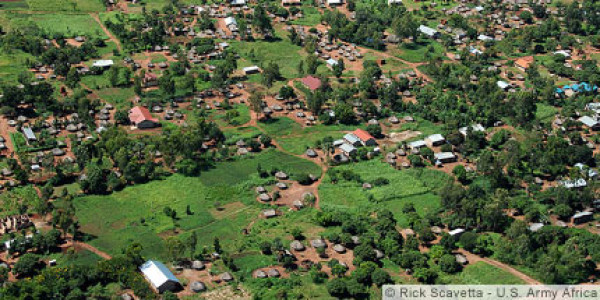G8 leaders ‘need to go further’ on food security in Africa by Jonathan M. White 14 June 2013 When they meet at Lough Erne, G8 leaders will have to reconcile two competing visions of the New Alliance initiative started last year to lift millions of people out of poverty, says think-tank The New Alliance for Food Security and Nutrition – a joint initiative of African leaders, the private sector, and G8 governments – was launched at last year’s G8 Summit with the ambitious goal of lifting 50 million people out of poverty by 2022. Over the past 12 months, 91 per cent of G8 government commitments have been disbursed on time, and more than half of the private sector investments, worth a total of over $3bn, have commenced. From creating an electronic customs clearance system for agriculture commodities in Burkina Faso to a new seed law in Ghana, New Alliance policy actions could prove to be transformational and strengthen food security in participating countries, which also include Ethiopia, Tanzania, Côte d’Ivoire, and Mozambique. During a pre-G8 Summit event on nutrition last week, Nigeria, Benin and Malawi signed up as well. When they meet at Lough Erne, the G8 leaders will have to reconcile two competing visions of the New Alliance. Some argue that, although well intended, it will not result in sustainable or responsible investments. Big global companies only understand large-scale intensive single crop production models, which are often highly destructive to biodiversity and the social fabric of smallholder farming communities. While the flow of corporate investment and the adoption of modern farm management, skills, and technology will increase agricultural production, these benefits would come at a high cost. Investments will also go toward exportable products and not the local market, making smallholder farmers increasingly dependent on volatile international markets. Others contend that the New Alliance aligns public and private resources with country-led strategies that are consistent with host-country priorities and needs. The initiative is also supportive of multinational guidelines on the governance of land, fisheries, and forests, designed to guard against land grabs and social disruption. Proponents argue that corporate investors, non-governmental organisations, and development partners will assist smallholder farmers integrate into agriculture value chains by helping them organise into cooperatives and engage in contract farming Public-private partnerships and innovative business models will ensure both development and commercial goals are achieved. Which narrative is right? Each holds some merit. In at least four New Alliance countries, there is evidence that local communities have not been sufficiently consulted by investors or governments in land transactions. In two countries, the compensation to households affected by these land investments has been determined to be inadequate. While public-private partnerships are promising, it is clear that some companies simply do not understand how to engage with smallholder farmers. At the same time, the Grow Africa initiative, which is supporting the New Alliance, has reported that more than $60 million invested so far has incorporated smallholder farmers into market-based activities. Approximately 270,000 metric tonnes of commodities were sourced, generating $300m in sales for farmers. Nearly 800,000 smallholders have benefited from a mix of training, service provisions, and market access. While land grabs are a concern, the New Alliance is not dominated by large global corporations. Many sizeable investments are, in fact, driven by African firms and small and medium-sized enterprises. Grow Africa data covers New Alliance countries minus Côte d’Ivoire and plus Kenya and Rwanda. At the heart of the debate over these competing visions is the role of the private sector. Business and trade are often viewed as sources of plunder in Africa – the depletion of oil, gas, and natural resources through shadowy networks of business and government officials. Africa’s economic growth and rising middle class are promising, and African leaders have clearly committed to private sector development. Yet, this has not completely tipped the balance in local perceptions about the private sector. Weak governance and corruption further undermine trust in both governments and business. As the host of the upcoming G8 Summit, British Prime Minister David Cameron will have to navigate this thicket of issues. He is off to a good start, forming a ‘coalition of the willing’ to publish guidelines for land transactions and making progress on nutrition through the Global Nutrition for Growth compact and commitments . Transparency through the release of the 2013 New Alliance progress report will build confidence behind the initiative. But global leaders will need to go further. New Alliance dialogues must be embedded in local contexts, opening them more broadly to public debate through formal platforms or institutions. This means local public and private sector leaders will have to step up. Others can help, but it is these local actors who must ultimately build the mechanisms that will strengthen governance and reveal which investment models succeed or fail, so that we may learn along the way to enabling agricultural transformational in Africa. Jonathan M. White is a transatlantic fellow with the German Marshall Fund of the United States, which first published this article in its Transatlantic Take series as Can the G8 Navigate Competing Visions for Food Security in Africa? Read more: http://www.publicser…a#ixzz2WrP1lKzS Taylor Scott International
G8 Leaders ‘Need To Go Further’ On Food Security In Africa

This entry was posted in Investment, investments, Kenya, News, Property, Taylor Scott International, TSI, Uk and tagged alternative, calendar, food, german, investment, investments, javascript, kenya, nutrition, security, united-states. Bookmark the permalink.







